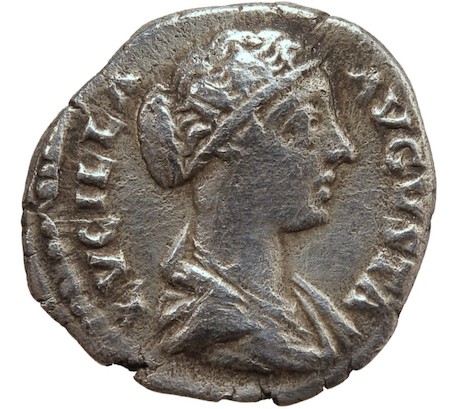Once a month here on the Molten Sulfur Blog, I run content taken from our book Archive: Historical People, Places, and Events for RPGs. This post is one of eighty entries in Archive, each more gameable than the last!
This post is brought to you by beloved Patreon backer Arthur Brown. Thanks for helping keep the lights on! If you want to help keep this blog going alongside Arthur, head over to the Patreon page – and thank you!

Lucilla
Imperial Has-Been and Failed Assassin
Annia Aurelia Galeria Lucilla was born into an influential Roman political family. She was the second daughter of Roman emperor Marcus Aurelius, and the older sister of future Roman emperor Commodus. Her life was a tangled mess: bound up in webs of politics, promiscuity, and influence, simultaneously powerful and powerless. Today, she is best remembered for an act of failed assassination driven perhaps by petty jealousy, nobility of spirit, or both.
Much of Lucilla’s childhood has been lost in time, but when she was between 11 and 13 years old, her father arranged a marriage for her with his co-emperor Lucius Verus. He was 18 years older than her, and married her three years after the arrangement. Upon marrying an emperor, Lucilla received the title of Augusta and became an empress. Around this time, Marcus Aurelius and Lucius Verus were fighting a war in Syria, while Lucilla was enjoying her status. She was an influential and respectable woman who spent much of her time in Rome. But around 168-169 A.D., tragedy struck. Lucius Verus died in war. With his death, Lucilla was stripped of her title and lost her status as empress. Her father arranged a second marriage with Tiberius Claudius Pompeianus Quintianus, a political ally of the family. Lucilla was against the marriage, mostly because Quintianus was not of her Roman noble social rank. They married nonetheless.
In 180 A.D., Marcus Aurelius died and Lucilla’s younger brother Commodus became the new emperor, erasing any hope of Lucilla becoming empress again. It is around this time that reports of Lucilla became unfavorable. She didn’t want to be simply a private citizen of Rome. Clinging to the imperial honors bestowed upon her by her first marriage, she still tried to live as an empress. She occupied the emperor’s box at the theater and when she passed through the streets, she would have the sacred fire, the symbol of majesty, carried before her. It was also rumored she took numerous lovers. Her sister-in-law, Commodus’ wife, rightly claimed the true title of Empress. Lucilla loathed her.
At some point, Lucilla became concerned by Emperor Commodus’ erratic behavior and its effect on the stability of the empire, but some reports claim Commodus had shown no symptoms of mercilessness or instability. Regardless, as Commodus was traversing a dimly-lit passage in the palace, a man, in some reports Quintianus’ nephew, rushed forward, crying out, “The Senate sends you this!”. Though the words were meant to be the last Commodus heard, they tipped off the nearby guards, who overpowered the assassin. A brief investigation uncovered that Lucilla, dissatisfied with her secondary place in the Empire, armed the man with the weapon and the idea of assassination. Her husband was not privy to the plot, suggesting that after Commodus’ death, Lucilla planned to place one of her lovers on the throne.
Lucilla’s choice of an incompetent assassin led to her being exiled to the island of Capri, near Naples. After the plot, Commodus is said to have become incredibly cruel. He ordered the death of Quintianus’ nephew and of suspected conspirators. He banished Lucilla’s daughter and other suspected female conspirators to Capri as well, and sent a centurion later that year to execute all of them. After Lucilla’s execution, Commodus believed himself to be a second Hercules and executed many wealthy Romans just to acquire their fortunes. While some believe Lucilla’s plot was solely fueled by jealousy, perhaps she saw Commodus’ breakdown coming, and truly wanted to save Rome.
Lucilla in Play
In a political campaign, an NPC based on Lucilla could be marvelously unpredictable. Will she act out of petty jealousy? Rise above it and act for the good of the empire? The answer might change with time. Lucilla might enlist your party to assassinate her brother. If the PCs are less informed about the situation, they might believe the rumors spread about her, that she only craved to be empress again. But if they are more in tune with politics, they might be able to understand her concerns, and see the contradictions within her. The party could decide her fate with their actions. Perhaps the PCs get involved after Lucilla’s death, maybe they even supported her execution. But when Commodus starts showing signs of cruel instability, they learn that only Lucilla knew secret passageways in the palace, or simply when Commodus lets his guard down. In a fantasy campaign, the party could resurrect her to acquire her knowledge in order to carry out a new assassination attempt. In a less magical campaign, the party might have to reconstruct her knowledge from her letters and journals, which are in private collections spread across half of Rome. Every powerful NPC who holds a piece of the puzzle would need to be separately bargained with, blackmailed, or befriended for the PCs to regain all of Lucilla’s knowledge.






